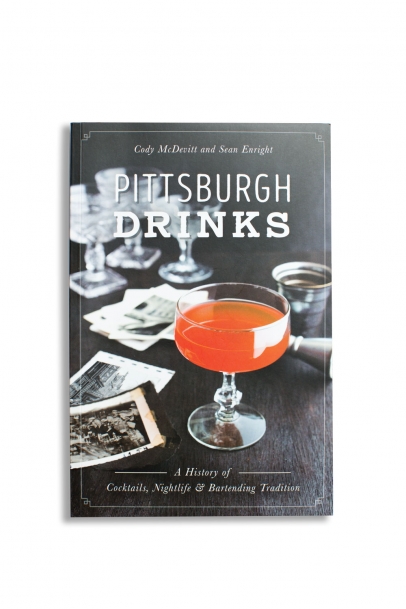Go Inside "Pittsburgh Drinks: A History of Cocktails, Nightlife, and Bartending Tradition"
By Olivia Kappler
The Pittsburgh nightlife has been one to watch for decades. From the speakeasies during Prohibition, to the signature cocktails of today, and all of the lively personalities who enjoyed everything in between, there are countless stories to tell. So local authors Cody McDevitt and Sean Enright wrote "Pittsburgh Drinks: A History of Cocktails, Nightlife, & Bartending Tradition” to illustrate for us that the signature of Pittsburgh is not just the history of the nightlife, but also the signature drinks of Pittsburgh bars and how it all came to be. We chatted with the authors to get a closer look inside the book.
How did the two of you get the idea to do this book?
Sean Enright: I’d been working on a recipe and technique book for a few years that was constantly evolving. Over the years, from Embury to Spoon to Bar Marco, I had compiled a recipe book that I’d share at each location I worked, either as a bartender or general manager. I wanted to eventually share the recipes from Pittsburgh’s top bartenders with other markets. Pittsburgh is often overlooked on a national level, though our talent is the best I’ve experienced across the country. Cody and I eventually met through social media chatter and realized we had two projects that could reach a larger market if we joined forces. My inspiration has always been to promote the talent in Pittsburgh. We have a unique creative perspective when it comes to cocktails. I think other bartenders across the country will enjoy these recipes and possibly be inspired creatively by them.
Can you talk a little bit about the setup of the book?
Cody McDevitt: The book is set up in two parts: One is a narrative, cultural history that tells Pittsburgh's story as it evolved through speakeasies, cafes, cocktail lounges, discotheques, and nightclubs into the gastropubs and brewpubs of today. It also tells how certain neighborhoods came into and fell out of favor throughout our history. Old photos are also included throughout the book from private collections, museums, and the Pittsburgh Post-Gazette's archives. The second part of the book is a collection of recipes from and profiles of local bartenders, as well as one chef.
Each chapter of the book seems to go into detail about the different histories of bars and nightlife in Pittsburgh. Is there a chapter in particular that stands out to you the most?
Enright: I‘m partial to the first section. When I started at Embury, we prided ourselves on being a “Pre-Prohibition” Cocktail Bar. We studied the history and cocktails of the late 1800s, and I guess that had a lasting impression. I’ve always been a bit of a history buff and applied historical reference to my cocktail and wine education. Drink history before prohibition is often confusing and not very well documented, so anytime a writer does the research we can learn a new aspect to an era that was poorly documented.
What is your favorite drink featured in the book?
McDevitt: The Fussfungle.
Enright: Mine, obviously. Just kidding! Faust Pact by Fred Sarkis is the definitive cocktail that ushered in the craft cocktail movement in Pittsburgh. It introduced Pittsburgh bartenders to technique and flavor profiles they’d had little exposure to beforehand. When I took over Fred’s mantle at Embury, it was easily the most ordered cocktail. Still a favorite of mine. A timeless classic.
What do you hope readers take away from the book?
Enright: Not only will they learn about this part of Pittsburgh’s rich history, readers will also have access to over 70 recipes from Pittsburgh’s best bartenders to be easily recreated at home, and will be introduced to all of our top talent and the bars they work at.
McDevitt: We've been proclaimed the next great destination in America for a number of years now. Ultimately, on every one of those lists, it's always an argument based on a favorable comparison to another major vacation spot or metropolitan area like New York. But Pittsburgh is not a great town because of how well it stacks up to other cities. It's a great city because of our heritage, our history, and all the people who came before. It's a great city because our fathers and mothers drank and worked here, as did their fathers and mothers. We should embrace that rather than celebrating every time someone from another area says we're as great as them. I hope this book makes people think that way.
To order your copy of the book, visit amazon.com.





